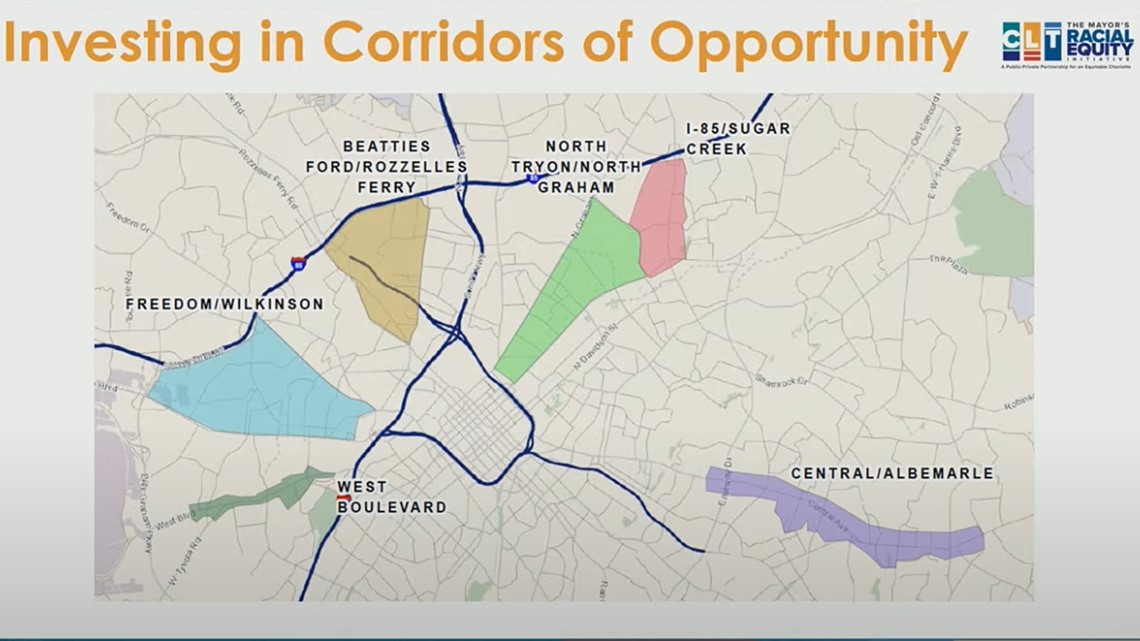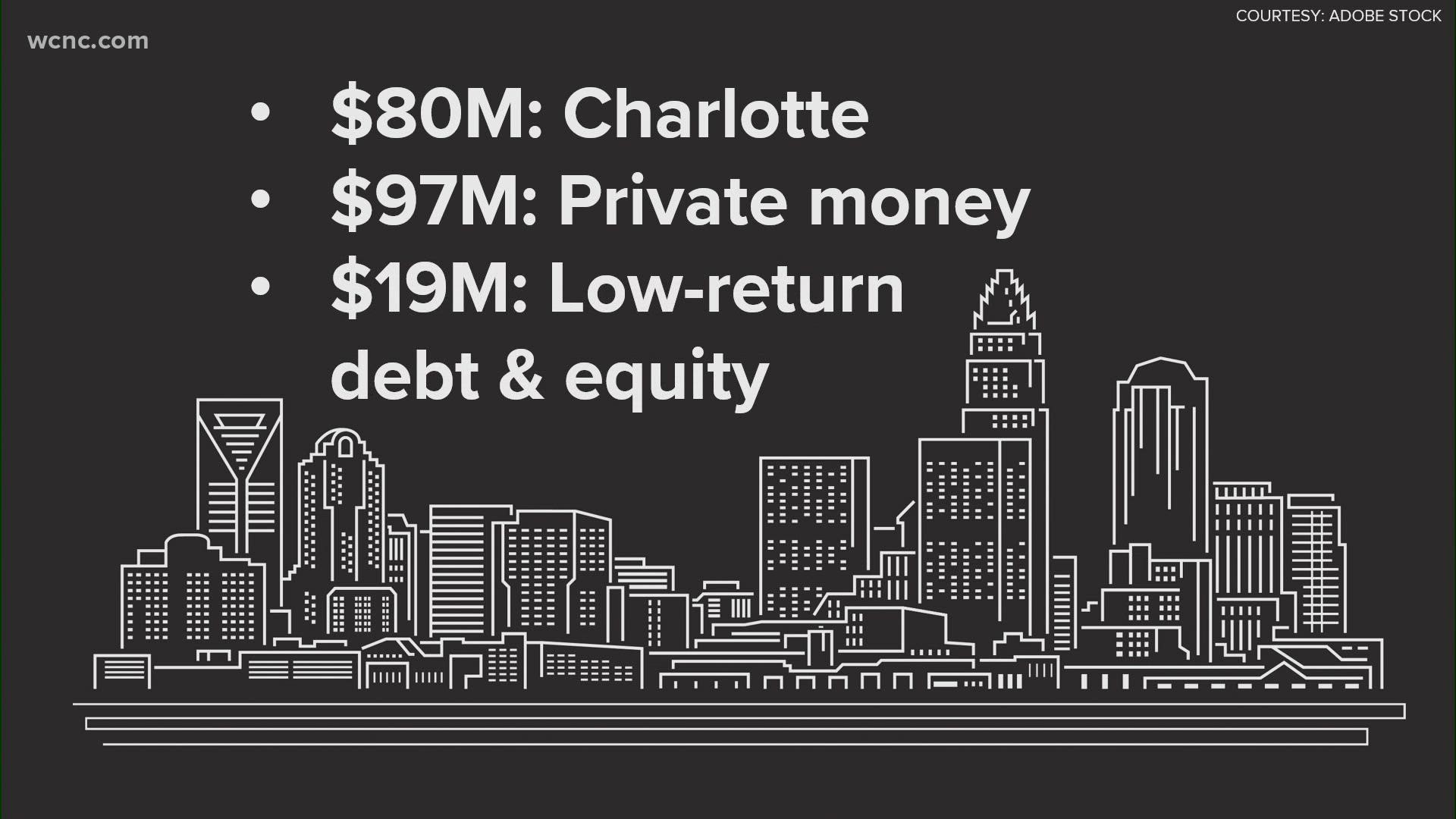CHARLOTTE, N.C. — Charlotte Mayor Vi Lyles joined government and business leaders from throughout Charlotte at Johnson C. Smith University Monday to announce a $250 million private-public partnership to address racial equity and provide new opportunities.
The Mayor's Racial Equity Initiative has already gathered nearly 80% of its fundraising goal. Of the $196 million raised thus far, $80 million came from the City of Charlotte, $97 million from private business, and $19 million from low-return debt and equity.
“The issues we face as a community are bigger, broader, and more deep-seated than any one organization can address alone,” Charlotte Mayor Vi Lyles said. "The response from our corporate partners surpassed even what I could have expected, and we have set a new standard for an American city."
Atrium Health CEO Gene Woods, speaking at the event Monday, called the effort "unprecedented" and "historic."
Lyles said the solutions have long been needed.
"What we are trying to do is make that opportunity for everyone to be a part of this place that we choose to have as home," Lyles said in an interview after the event. "It is about what we can have in this community for all."
How did we get here and how will it work
Following the murder of George Floyd in 2020, and nationwide movements - including those in Charlotte - that "exposed longstanding racial inequities," more than 90 Charlotte-area businesses and community representatives gathered together, organizers explained. The group became known as the Charlotte Executive Leadership Council (CELC).
Two oversight boards will "review benchmarks and authorize the distribution of dollars" to the initiative's four main pillars. The boards will be led by Malcomb Coley, US central private leader and Charlotte managing partner of EY, and Janet LaBar, president and CEO of the Charlotte Regional Business Alliance.
Foundation For The Carolinas is leading fundraising efforts, and the money raised will be held in a fund at the Foundation.
Improving Johnson C. Smith University
Initiative goal: $80 million


Among the program's goals is to raise JCSU into the top ten of historically Black colleges and universities in the country. Officials hope to do this through the introduction of new scholarships and better recruitment. Their goal is to recruit 200 exceptional students each year.
A private-sector gift of $40 million from The Duke Endowment will be directed to the JCSU initiative.
The program hopes to launch "strong career outcomes and seamless academic pathways," Coley said during the announcement Monday.
Charlotte's six corridors of opportunity
Goal: $109 million


Among the goals is creating an investment fund to provide loans, grants, and land acquisitions specifically within Charlotte's six Corridors of Opportunity.
- Freedom / Wilkinson
- Beatties Ford / Rozzelles Ferry
- North Tryon / North Graham
- I-85 / Sugar Creek
- Central / Albemarle
- West Boulevard
"Provide equitable access to capital for Black- and Brown- business owners through a more flexible lending platform. Loans would also be available to small business owners in the corridor," President and CEO of the Charlotte Business Alliance Janet LaBar said.
This initiative will see $62 million from the public sector, $37 million from private sector debt and equity, and $10 million from private sector philanthropy.
Bridging the digital divide
Initiative goal: $58 million
The formation of the Center of Digital Equity will provide Internet access and devices to vulnerable communities. It will also teach digital literacy to students and residents.
"When COVID-19 struck, and our school buildings closed... 16,000 students were unable to participate in daily learning with their peers," Coley said
Roughly 55,000, or about 14%, of Mecklenburg County households, are unable to access the Internet at home, according to provided figures.
The goal is $58 million, with $38 million from the public sector and $20 million from the private sector.
Advancement of Black and Brown business leaders
Initiative goal: $3 million
Goals, baselines, and progress reporting is expected to create a "pipeline for Black and Brown talent," according to Monday's presentation. Organizers hope to "elevate Black and Brown talent to management, C-suites, and boards."
The goals will be funded by $3 million in private sector philanthropy.
Public dollars being spent
A total of $80 million taxpayer money is going to the program.
- $72 million from the City of Charlotte
- $8 million from the Charlotte Mecklenburg Library
Donations from private businesses
The program provided a list of initial donations from the private sector, including:
- $25 million from Bank of America
- $10 million from Lowe’s
- $8 million from Truist
- $6.1 million from Atrium Health
- $5.7 million from Queens University of Charlotte
- $5 million each from Ally Financial and Ric Elias
- $3 million from Novant Health and Duke Energy
- $1 million each from CLT2020 Host Committee, EY, the Michael Jordan Family/the Charlotte Hornets Foundation (a combined gift), National Gypsum/CD Spangler Foundation (a combined gift), and Trane Technologies
- $500,000 from Mary and Mike Lamach
- $220,000 from Bloomberg Philanthropies.
Wake Up Charlotte To Go is a daily news and weather podcast you can listen to so you can start your day with the team at Wake Up Charlotte.
SUBSCRIBE: Apple Podcasts || Spotify || Stitcher || TuneIn || Google Podcasts
All of WCNC Charlotte's podcasts are free and available for both streaming and download. You can listen now on Android, iPhone, Amazon, and other internet-connected devices. Join us from North Carolina, South Carolina, or on the go anywhere.

